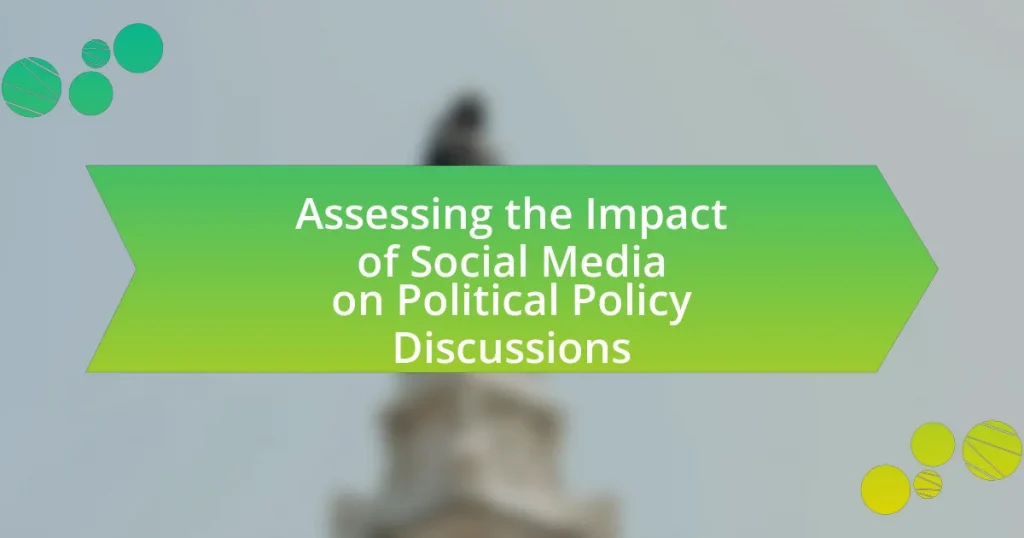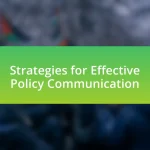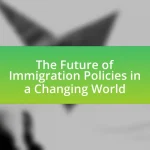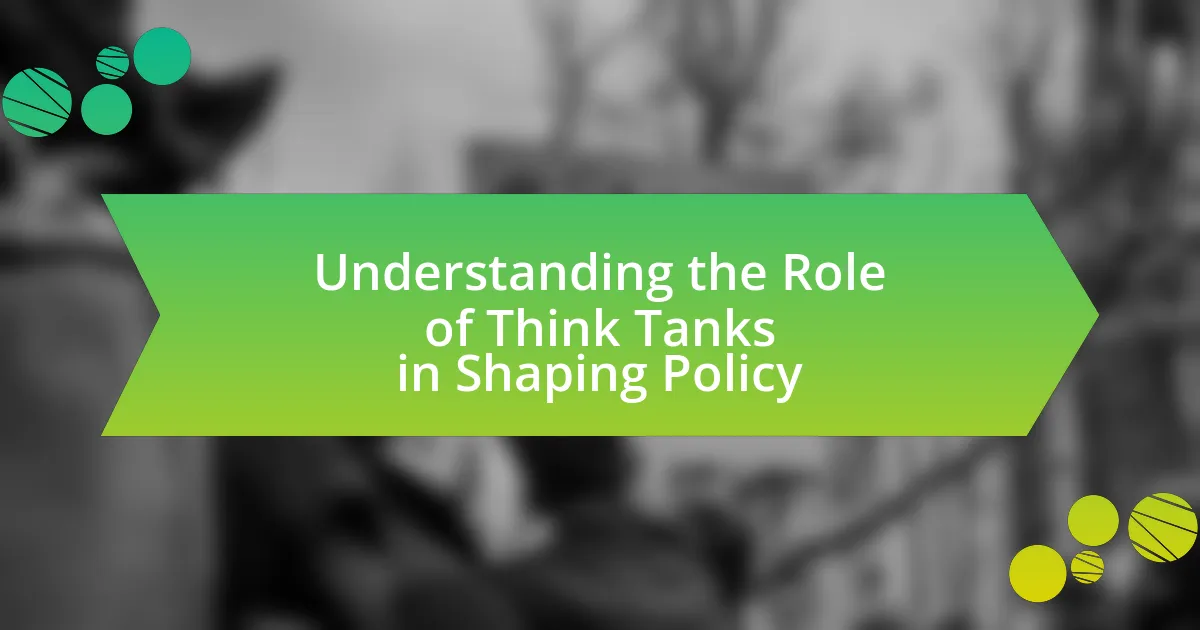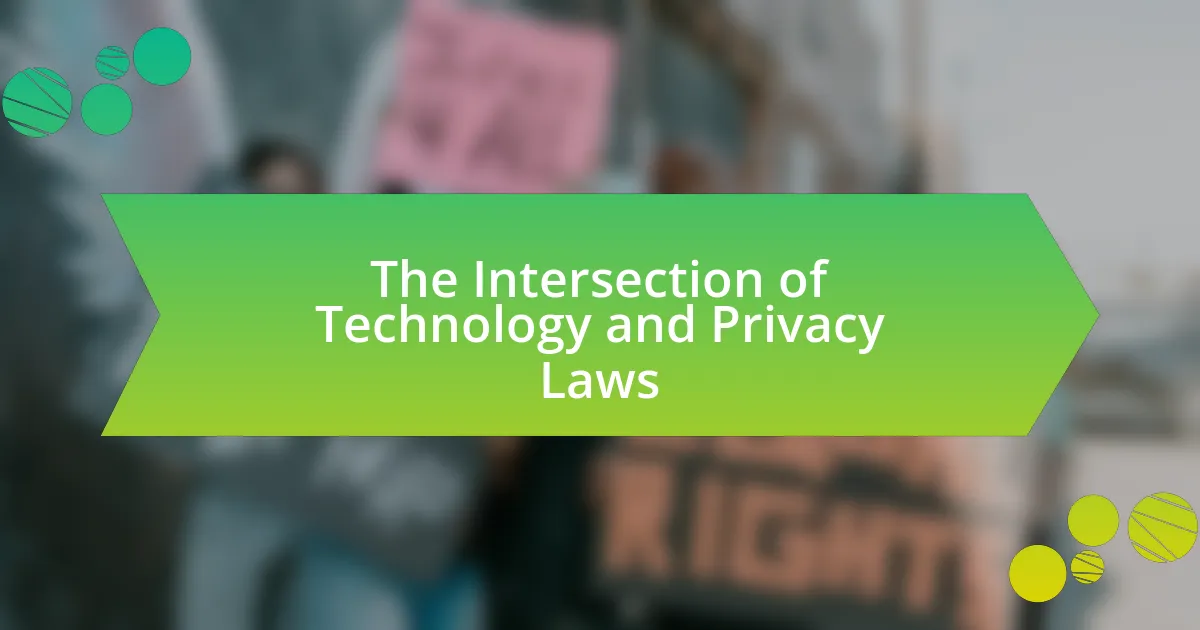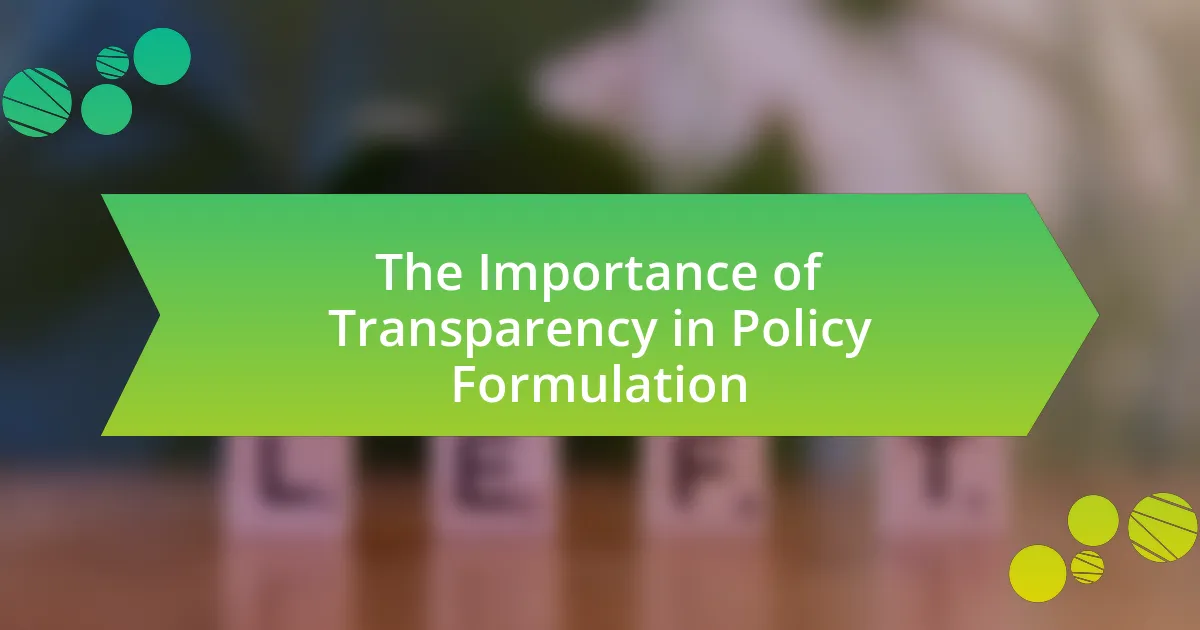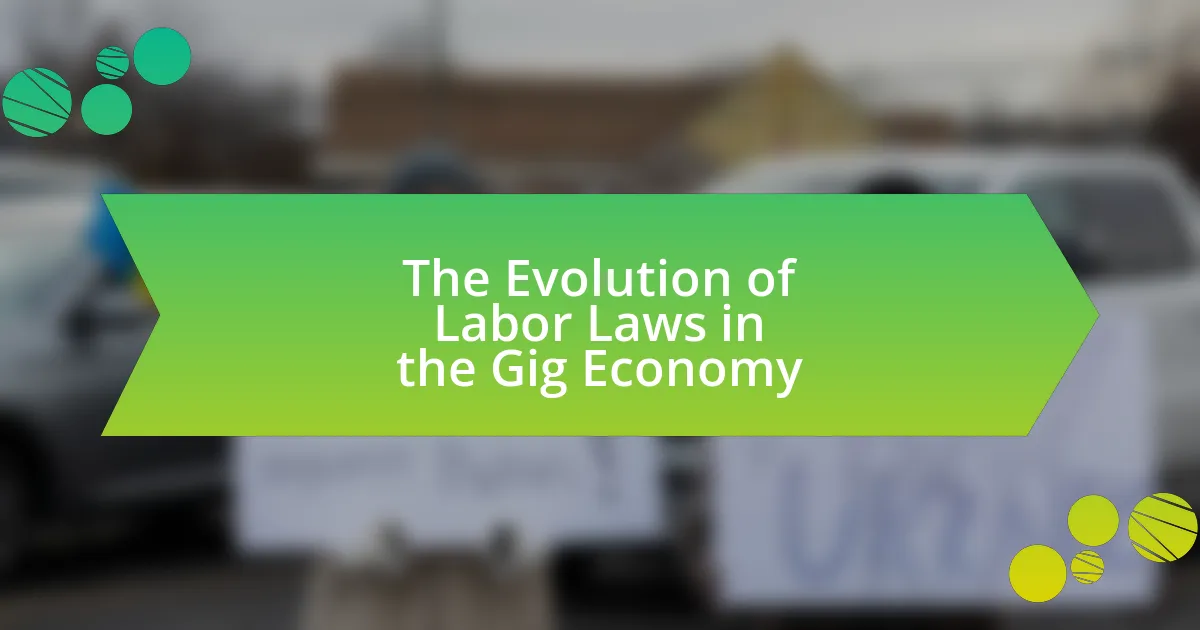The article assesses the impact of social media on political policy discussions, highlighting its role in facilitating rapid information dissemination and direct engagement between policymakers and the public. It explores how platforms like Twitter and Facebook transform political discourse by enabling real-time communication, shaping public opinion, and mobilizing grassroots movements. Additionally, the article examines the negative effects of misinformation and polarization, as well as the strategies policymakers can employ to effectively engage with social media, counteract misinformation, and promote accurate information. Overall, it emphasizes the significance of understanding social media’s influence on democratic processes and public engagement in political discussions.
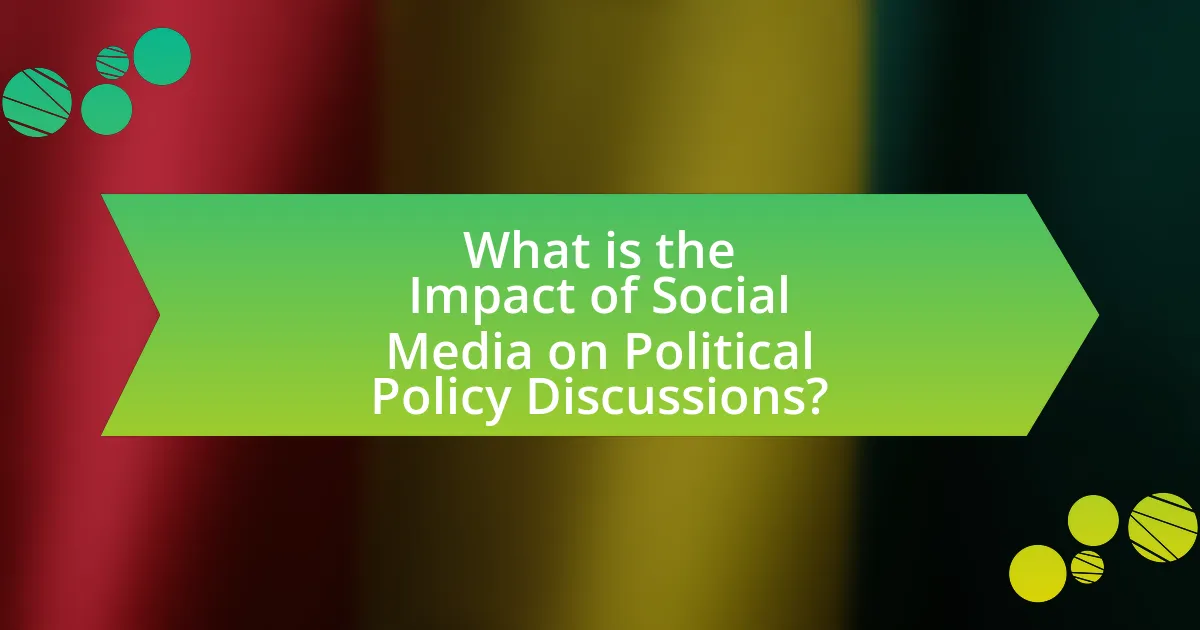
What is the Impact of Social Media on Political Policy Discussions?
Social media significantly influences political policy discussions by facilitating rapid information dissemination and enabling direct engagement between policymakers and the public. This platform allows for diverse viewpoints to be shared widely, impacting public opinion and, consequently, the policy-making process. For instance, studies have shown that social media campaigns can mobilize grassroots movements, as seen in the Arab Spring, where platforms like Twitter and Facebook played crucial roles in organizing protests and shaping political discourse. Additionally, research from the Pew Research Center indicates that 69% of adults in the U.S. use social media, highlighting its role as a primary source of news and information, which further underscores its impact on political discussions.
How has social media transformed political discourse?
Social media has transformed political discourse by enabling real-time communication and engagement between politicians and the public. This shift allows for immediate feedback on policies and political events, fostering a more participatory political environment. For instance, platforms like Twitter and Facebook have become essential tools for political campaigns, where candidates can directly address voters, share their views, and respond to criticism instantly. According to a Pew Research Center study, 69% of adults in the U.S. use social media, which highlights its role in shaping public opinion and political engagement. Furthermore, social media has facilitated the spread of diverse viewpoints, allowing marginalized voices to be heard, which can influence mainstream political narratives.
What role do platforms like Twitter and Facebook play in shaping public opinion?
Platforms like Twitter and Facebook significantly influence public opinion by facilitating the rapid dissemination of information and enabling user engagement. These platforms serve as primary channels for news sharing, where users can access diverse viewpoints and participate in discussions, thereby shaping perceptions on various issues. Research indicates that social media can amplify certain narratives, as seen in the 2016 U.S. presidential election, where misinformation spread widely, impacting voter attitudes and behaviors. Additionally, studies show that social media interactions can create echo chambers, reinforcing existing beliefs and polarizing public opinion.
How do algorithms influence the visibility of political content?
Algorithms significantly influence the visibility of political content by determining which posts are prioritized in users’ feeds based on engagement metrics and user preferences. These algorithms analyze user behavior, such as likes, shares, and comments, to curate content that aligns with individual interests, often amplifying sensational or polarizing political messages. Research by the Pew Research Center indicates that social media algorithms can create echo chambers, where users are predominantly exposed to viewpoints that reinforce their existing beliefs, thereby shaping public discourse and political polarization.
Why is understanding this impact important for policymakers?
Understanding the impact of social media on political policy discussions is crucial for policymakers because it shapes public opinion and influences voter behavior. Social media platforms serve as primary channels for information dissemination, where citizens engage in discussions that can sway political agendas. For instance, a Pew Research Center study found that 69% of adults in the U.S. use social media, highlighting its role in shaping perceptions and mobilizing political action. By comprehending these dynamics, policymakers can better address constituents’ concerns, tailor communication strategies, and enhance democratic engagement.
How can social media shape voter behavior and engagement?
Social media can significantly shape voter behavior and engagement by facilitating information dissemination and fostering community discussions. Platforms like Facebook and Twitter enable users to access diverse political content, which influences their opinions and voting decisions. For instance, a study by the Pew Research Center found that 69% of adults in the U.S. use social media, and among these users, 57% have engaged in political discussions online, indicating a direct correlation between social media usage and political engagement. Additionally, targeted advertising on social media allows campaigns to reach specific demographics, further impacting voter turnout and preferences.
What are the implications for democratic processes?
The implications for democratic processes include the potential for increased polarization and misinformation, which can undermine informed citizen engagement. Social media platforms facilitate rapid dissemination of information, but they also enable the spread of false narratives, as evidenced by studies showing that misinformation can significantly influence public opinion and voting behavior. For instance, a 2018 study published in the journal “Science” found that false news stories were 70% more likely to be retweeted than true stories, highlighting the challenges social media poses to democratic discourse. Additionally, algorithms that prioritize sensational content can create echo chambers, further entrenching divisions within the electorate. These factors collectively threaten the foundational principles of democracy, such as informed decision-making and constructive debate.
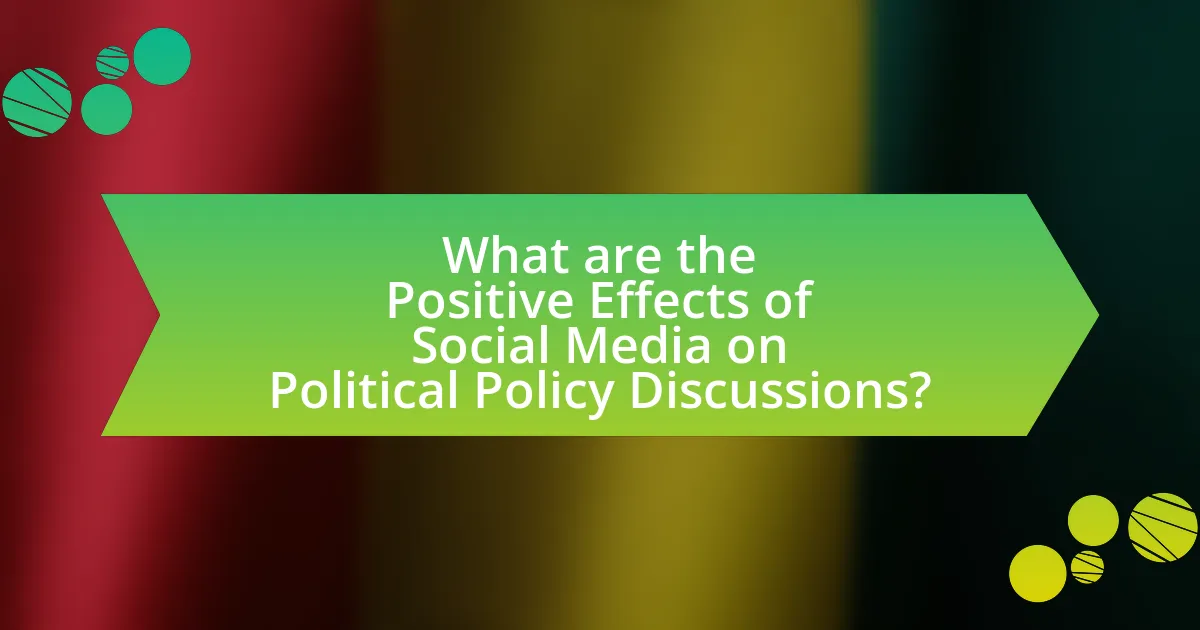
What are the Positive Effects of Social Media on Political Policy Discussions?
Social media positively influences political policy discussions by enhancing public engagement and facilitating the rapid dissemination of information. Platforms like Twitter and Facebook allow citizens to express their opinions, mobilize support for causes, and directly interact with policymakers, thereby increasing transparency and accountability. For instance, a study by the Pew Research Center found that 69% of adults in the U.S. use social media, which has become a vital tool for political discourse, enabling diverse voices to participate in discussions that were previously dominated by traditional media. This democratization of information fosters a more informed electorate and encourages policymakers to consider public sentiment in their decision-making processes.
How does social media facilitate political engagement?
Social media facilitates political engagement by providing platforms for users to share information, mobilize support, and participate in discussions about political issues. These platforms enable real-time communication and interaction, allowing individuals to express their opinions, organize events, and rally support for causes. For instance, studies show that social media campaigns can significantly increase voter turnout; the 2012 U.S. presidential election saw a 12% increase in turnout among young voters who were engaged through social media platforms. Additionally, social media allows for the rapid dissemination of information, making it easier for users to stay informed about political developments and participate in civic activities.
What are the benefits of increased access to information?
Increased access to information enhances informed decision-making among individuals and communities. This access allows people to engage more effectively in political discussions, as they can evaluate policies based on comprehensive data and diverse perspectives. For instance, studies show that individuals who consume a variety of news sources are more likely to understand complex political issues and participate in civic activities, leading to higher voter turnout and more robust public discourse. Furthermore, increased information access fosters transparency and accountability in governance, as citizens can scrutinize government actions and advocate for policy changes based on factual evidence.
How do online platforms empower marginalized voices?
Online platforms empower marginalized voices by providing accessible channels for expression and community building. These platforms enable individuals from underrepresented groups to share their experiences, mobilize support, and influence public discourse. For instance, social media has facilitated movements like #BlackLivesMatter and #MeToo, which have raised awareness about systemic injustices and prompted policy discussions. Research indicates that 70% of social media users believe these platforms help amplify voices that are often overlooked in traditional media, demonstrating their role in fostering inclusivity and driving social change.
What role does social media play in mobilizing grassroots movements?
Social media plays a crucial role in mobilizing grassroots movements by providing a platform for rapid communication and organization among individuals. It enables activists to share information, coordinate actions, and build community support quickly and effectively. For instance, during the Arab Spring, social media platforms like Twitter and Facebook were instrumental in organizing protests and disseminating information, leading to significant political changes in several countries. Research by the Pew Research Center indicates that 69% of Americans believe social media is an important tool for political engagement, highlighting its effectiveness in mobilizing grassroots efforts.
How have recent movements utilized social media for advocacy?
Recent movements have utilized social media for advocacy by leveraging platforms to mobilize support, disseminate information, and engage in dialogue. For instance, the Black Lives Matter movement effectively used Twitter and Instagram to share real-time updates, organize protests, and amplify voices of marginalized communities, resulting in widespread global awareness and policy discussions surrounding racial justice. Additionally, the #MeToo movement harnessed Facebook and Twitter to create a viral conversation about sexual harassment, leading to significant changes in workplace policies and legal reforms. These examples illustrate how social media serves as a powerful tool for advocacy, enabling movements to reach larger audiences and influence political discourse.
What strategies have proven effective in leveraging social media for policy change?
Effective strategies for leveraging social media for policy change include mobilizing grassroots campaigns, utilizing targeted messaging, and engaging influencers. Grassroots campaigns, such as the #MeToo movement, have demonstrated the power of collective voices in raising awareness and prompting legislative action. Targeted messaging, exemplified by the use of data analytics to tailor content to specific demographics, has been shown to increase engagement and drive action, as seen in various climate change initiatives. Engaging influencers, like celebrities or experts, can amplify messages and reach broader audiences, evidenced by campaigns that successfully influenced public opinion and policy decisions. These strategies collectively enhance the ability to effect change through social media platforms.
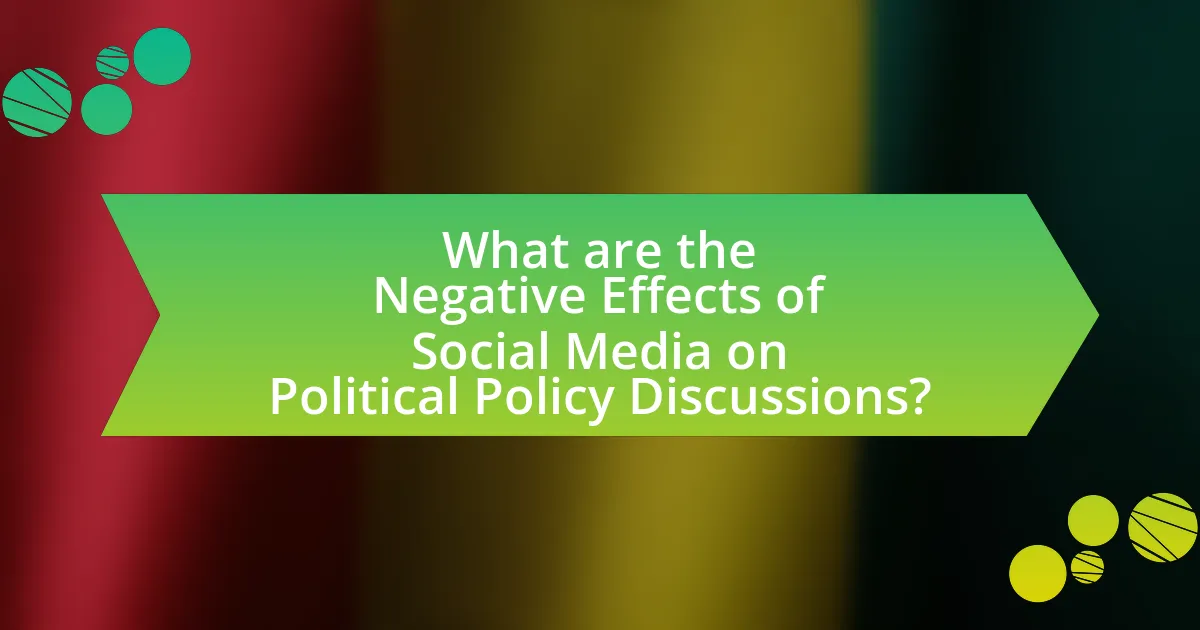
What are the Negative Effects of Social Media on Political Policy Discussions?
Social media negatively affects political policy discussions by fostering misinformation, polarization, and superficial engagement. Misinformation spreads rapidly on platforms like Facebook and Twitter, leading to public confusion and misinformed opinions on critical issues. A study by the Pew Research Center found that 64% of Americans believe fabricated news stories cause confusion about the basic facts of current events. Additionally, social media algorithms often promote content that reinforces existing beliefs, contributing to political polarization. This creates echo chambers where users are less likely to encounter diverse viewpoints, as evidenced by research from the University of California, which indicates that exposure to opposing views is significantly reduced in online environments. Lastly, the fast-paced nature of social media encourages superficial engagement, where users may react to headlines without fully understanding the complexities of policy issues, undermining meaningful discourse.
How does misinformation spread on social media platforms?
Misinformation spreads on social media platforms primarily through user engagement and algorithmic amplification. When users share, like, or comment on misleading content, these interactions signal to algorithms that the content is popular, leading to increased visibility and further dissemination. A study by the Massachusetts Institute of Technology found that false news stories are 70% more likely to be retweeted than true stories, highlighting the rapid spread of misinformation compared to factual information. Additionally, the lack of stringent fact-checking mechanisms on many platforms allows misleading content to proliferate unchecked, contributing to its widespread impact on political discourse.
What are the consequences of fake news on public perception?
Fake news significantly distorts public perception by spreading misinformation that influences beliefs and attitudes. Research indicates that exposure to false information can lead to increased polarization, as individuals may adopt extreme views based on misleading narratives. For instance, a study published in the journal “Science” found that false news stories are 70% more likely to be retweeted than true stories, demonstrating how misinformation can rapidly shape public discourse. Additionally, fake news can undermine trust in legitimate media sources, leading to skepticism about factual reporting and creating an environment where conspiracy theories thrive. This erosion of trust can have lasting effects on democratic processes and civic engagement.
How can misinformation impact policy decisions?
Misinformation can significantly distort policy decisions by shaping public perception and influencing lawmakers’ actions. When false information spreads, it can create misconceptions about issues, leading to misguided policies that do not address the actual needs of the population. For instance, during the COVID-19 pandemic, misinformation about the virus’s origins and transmission led to delayed responses and ineffective public health measures in various countries. Research from the Pew Research Center indicates that 64% of Americans believe misinformation has caused confusion about the pandemic, which directly impacted policy responses and public compliance with health guidelines. Thus, misinformation undermines informed decision-making in policy formulation, resulting in potentially harmful consequences for society.
What are the risks of polarization in political discussions on social media?
The risks of polarization in political discussions on social media include the exacerbation of societal divisions, the spread of misinformation, and the reduction of constructive dialogue. Polarization leads to echo chambers where individuals are exposed primarily to viewpoints that reinforce their own beliefs, diminishing the opportunity for understanding opposing perspectives. Research indicates that social media algorithms often prioritize sensational content, which can amplify extreme viewpoints and misinformation, further entrenching divisions. A study by the Pew Research Center found that 64% of Americans believe social media has a mostly negative effect on the way things are going in the country, highlighting concerns about its role in fostering divisive political climates.
How does echo chamber effect contribute to political division?
The echo chamber effect contributes to political division by reinforcing individuals’ pre-existing beliefs and isolating them from opposing viewpoints. This phenomenon occurs when people engage primarily with like-minded individuals and consume media that aligns with their perspectives, leading to a distorted perception of reality. Research indicates that social media algorithms often prioritize content that resonates with users’ interests, further entrenching these beliefs. A study by the Pew Research Center found that 62% of social media users are exposed to news that reflects their political views, which can exacerbate polarization by creating a feedback loop of confirmation bias.
What strategies can mitigate the effects of polarization?
Strategies that can mitigate the effects of polarization include promoting dialogue across differing viewpoints, fostering media literacy, and encouraging diverse representation in discussions. Engaging individuals in structured conversations that emphasize active listening can reduce misunderstandings and build empathy. Research indicates that media literacy programs enhance critical thinking skills, enabling individuals to better analyze information and recognize biases, which can counteract the effects of echo chambers. Additionally, diverse representation in political discussions ensures that multiple perspectives are considered, leading to more balanced policy outcomes. These strategies collectively contribute to a more informed and cohesive public discourse.
How can policymakers effectively engage with social media?
Policymakers can effectively engage with social media by actively participating in conversations, sharing relevant information, and responding to constituents’ concerns. This engagement allows them to gauge public sentiment and gather feedback on policy issues. For instance, a study by the Pew Research Center found that 69% of adults in the U.S. use social media, making it a vital platform for reaching a broad audience. By utilizing targeted messaging and interactive content, policymakers can foster a sense of community and transparency, which enhances public trust and encourages civic participation.
What best practices should be followed for effective communication on social media?
Effective communication on social media requires clarity, engagement, and responsiveness. Clarity ensures that messages are easily understood, which is crucial in political discussions where misinterpretation can lead to misinformation. Engaging with the audience fosters a sense of community and encourages dialogue, which is essential for discussing political policies. Responsiveness to comments and messages builds trust and shows that the communicator values the audience’s input. Research indicates that posts with clear language and direct engagement receive higher interaction rates, enhancing the overall impact of the communication.
How can policymakers counteract misinformation and promote accurate information?
Policymakers can counteract misinformation and promote accurate information by implementing comprehensive media literacy programs and establishing fact-checking initiatives. Media literacy programs educate the public on how to critically evaluate information sources, which is essential in an era dominated by social media. For instance, studies show that individuals with higher media literacy are better equipped to discern credible information from falsehoods. Additionally, fact-checking initiatives, such as those employed by organizations like PolitiFact and FactCheck.org, provide verified information and corrections to misleading claims, thereby fostering a more informed public discourse. These strategies have been shown to reduce the spread of misinformation and enhance the overall quality of information available to citizens.
